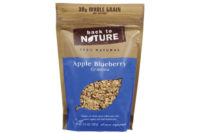Meating Demand
Vegetarianism may not be the largest trend in the food industry at present, but surprising numbers of young people are opting to go meat-free, while an aging population has its own reasons behind avoiding meats.
How much of a market is there for vegetarian products? A 2009 Vegetarian Resource Group (VRG) survey found about 1% of American consumers identify themselves as vegan, roughly a third of the number who regard themselves as vegetarians, but the group’s 2010 survey found a surprising amount of vegetarians among Americans between 8-18.
The VRG survey conducted by Harris Interactive found 7% of 8-18-year-olds say they never eat meat, with 12% of 10-12-year-old boys indicating they do not. Some 3% of the U.S. youth polled indicated they never consume meat, poultry or fish/seafood; 1% of the group never eats dairy, eggs or honey. The VRG noted, “When marketing to vegetarians, these numbers make a good case for producing vegan products, as well as creating items which will appeal to youth who are not vegetarian, but don’t eat meat. Remember that vegans also tend to be the ‘activists,’ who will push your product or business.” Furthermore, judging purely by the number of young people avoiding meat, the next generation would appear to be embracing vegetarianism at a rapid pace.
Young Meat Avoiders
8-18-year-olds in the U.S. who “Never Eat Meat”
Males 8%
Females 7%
Ages 8-12 8%
Ages 13-18 7%
Males, 10-12 12%
Females, 10-12 3%
Males, 13-15 5%
Females, 13-15 9%
Total 7%
Source: 2009 Harris Interactive nationwide survey of 1,258 U.S. youth ages 8-18, compiled for the Vegetarian Resource Group; sampling error roughly +/-3 percentage points
What Don’t They Eat?
% of 8-18-year-olds Reporting They “Never Consume”:
Fish 22%
Poultry 7%
Meat 7%
Eggs 11%
Dairy Products 6%
Honey21%
Source: 2009 Harris Interactive nationwide survey of 1,258 U.S. youth ages 8-18, compiled for the Vegetarian Resource Group; sampling error roughly +/-3 percentage points
As for adults, Cultivate Research finds this group is comprised of “frequent meat eaters.” Some 61% of U.S. adult respondents to its survey indicate they eat meat with “every” meal (14%) or with “most” meals (47%). One in four U.S. adults (25%) is considered a “moderate” meat consumer, consuming meat with roughly half of meals.
Cultivate Research did find a group it termed “semi-vegetarians” that eats meat with fewer than half of meals, while 1% are vegetarians who “never” consume meat. Semi-vegetarians, also known as flexitarians, are one of the “10 Marketing Trends for 2011,” according to the January 24, 2011, USA Today. That article found companies who market vegetarian foods have noticed the bulk of their sales coming from occasional meat eaters.
The vegetarian movement is by no means limited to retail products or strictly homegrown foods; in the National Restaurant Association’s “What’s Hot in 2011” poll of 1,500 chefs, more than half identified vegan entrées as a “hot trend,” making it number 71 out of 226 trends, just ahead of organic beer and drinkable desserts.
In its report, “Vegetarian Consumer Trends,” Cultivate Research identified three prevalent trends among the dietary patterns of U.S. adults: healthier eating, food safety concerns and convenience foods, at least two of which tend to be strong selling points of vegetarian foods. With an aging Baby Boomer population increasingly concerned about health issues, there could well be a shift toward meat reduction, due to perceived health benefits. Likewise, public debate swirls about the feed given to livestock, whether justified or not, and this could prompt further interest in vegetarianism – potentially organic vegetarianism, for that matter.
In addition to avoiding health concerns, meatless diets have had positive health news surrounding them of late. A British study at the University of Oxford and published in the March 23, 2011, online edition of the American Journal of Clinical Nutrition surveyed the diets of 27,600 consumers for up to 15 years and found about three in 50 meat eaters had developed cataracts, while only two in 50 vegans and vegetarians had, roughly translating to a 30-40% lower risk of cataracts among the vegetarians and vegans. The highest risk was found among those who consumed more than 100g of meat daily. The authors were clear to note the consumption of meat was not necessarily promoting cataracts, rather consuming a lot of vegetables might be protective or, for that matter, following a vegetarian diet may indicate other behaviors contributing to a generally healthier lifestyle.
Following a vegetarian diet also has been linked to a lower risk for metabolic syndrome, per an analysis of results from the Adventist Health Study 2 and reported online on March 16, 2011, ahead of the print version of Diabetes Care. According to the analysis, “Except for HDL cholesterol level, all metabolic risk factors were significantly lower in association with a vegetarian dietary pattern versus a nonvegetarian dietary pattern...The risk of having metabolic syndrome was also lower for the vegetarian dietary pattern.”
Not all health news surrounding vegetarianism has been positive, as one review of published articles in medical journals indicated vegetarian diets are often lacking in certain key nutrients. Fortification with such nutrients may be an undiscovered opportunity for manufacturers. Researcher Duo Li, professor of nutrition at Zhejiang University in Hangzhou, China, discovered vegetarian diets often lacked sufficient B12 and omega-3 fatty acids, particularly among vegans. Deficiencies in these are linked with decreased levels of HDL (good) cholesterol, contends the study published in the January 4, 2011, Journal of Agricultural and Food Chemistry.
From the April 18 Prepared Foods E-dition
Looking for a reprint of this article?
From high-res PDFs to custom plaques, order your copy today!





